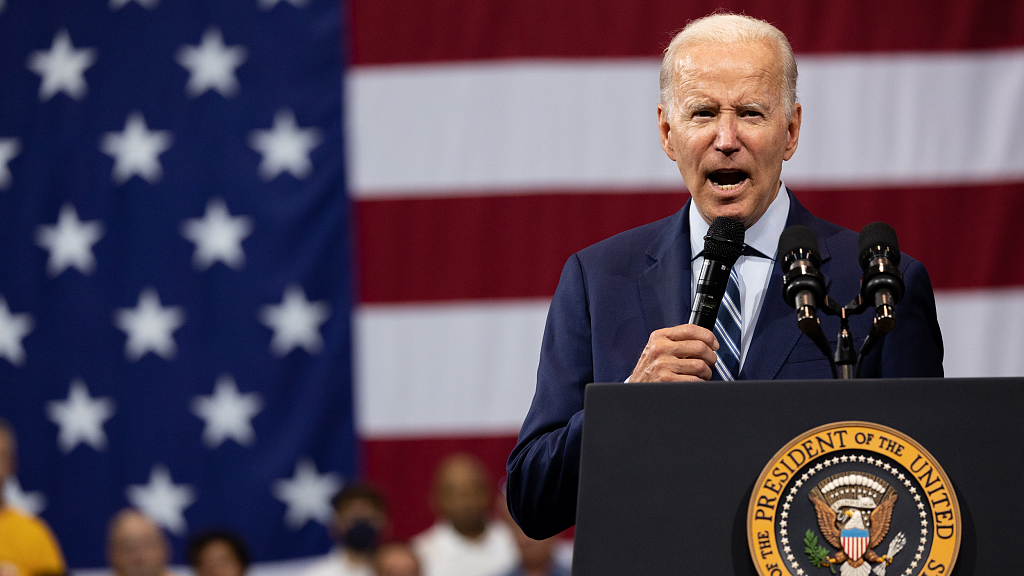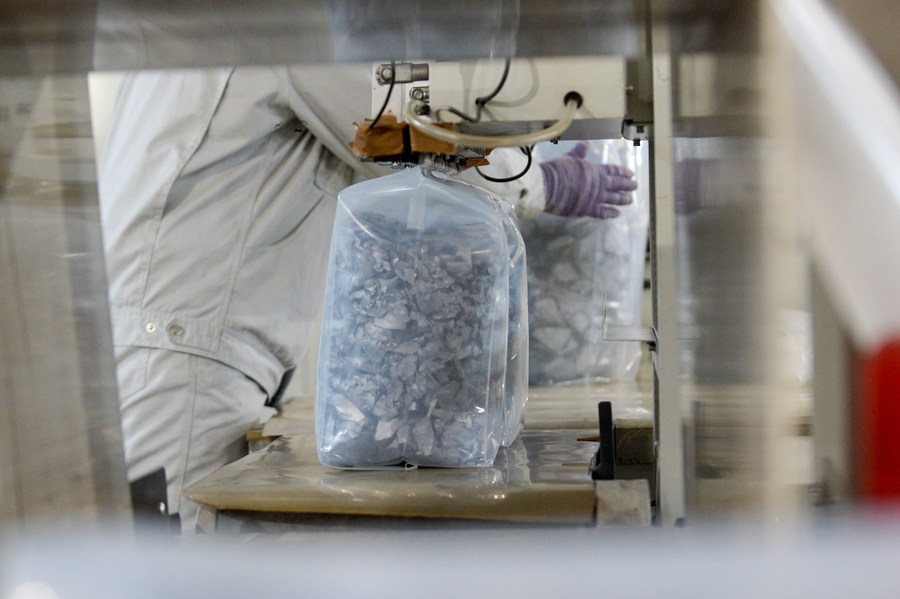
U.S. President Joe Biden speaks at the Arnaud C. Marts Center in Wilkes-Barre, Pennsylvania, U.S., August 30, 2022. /CFP
U.S. President Joe Biden speaks at the Arnaud C. Marts Center in Wilkes-Barre, Pennsylvania, U.S., August 30, 2022. /CFP
Editor's note: Yi Xin is a Beijing-based observer. The article reflects the author's opinions and not necessarily the views of CGTN.
Climate has been one of the top priorities for the Joe Biden administration. From the Bipartisan Infrastructure Law to the Build Back Better Act, a massive amount of money has poured into re-establishing the United States as a global leader on climate change. And recently, a bill representing the largest investment in combating climate change in U.S. history was signed into law. The Inflation Reduction Act (IRA) will raise around $370 billion to promote clean energy and reduce greenhouse gas emissions. The Biden administration is going to great lengths to scale up its climate ambitions, but will it still bring about a greener world?
On climate change, Washington's insincerity is infamous. Despite investments in green energy, the IRA includes numerous provisions that support oil and gas producers in order to ensure the swing-vote of Senator Joe Manchin. The Center for Biological Diversity even referred to it as a "climate suicide pact," since the provisions could give another boost to the domestic oil industry.
Over the years, the U.S. has been using climate as a tool to seek hegemony in the green industries, dominance in climate governance, and supremacy of unchecked national interests. The IRA is another case in point. One highlight of the bill is its promotion of electric vehicles (EV). A tax credit worth up to $7,500 will be provided to buyers of new all-electric cars, but with many restrictions. The car has to be assembled in North America to qualify for the full $7,500 tax credit and the components used in EV batteries can not get "extracted, processed, or recycled by a foreign entity of concern," which rules out many options from foreign countries, including China and Russia. So is this really about addressing climate issues or only serving hidden agendas, such as cutting off industrial and supply chains and building "a small yard with high fences."
Apart from the EV industry, the U.S. has also competed with and even contained certain countries in other areas. In the photovoltaic (PV) industry, while China has been providing solar cells and panels for the world to promote the use of clean energy to benefit all, Washington is playing its cards to buck this trend. The IRA seeks to reshore supply chains by stimulating domestic manufacturing of solar modules with tax credits. And months ago, the so-called Uygur Forced Labor Prevention Act, an extension of the lies and rumors the U.S. spreads about China's Xinjiang Uygur Autonomous Region, puts polysilicon, a key raw material in the PV supply chain that Xinjiang produces 45 percent of the world's total under intense scrutiny. Now that our time to tackle climate change is limited, resources should be distributed in a wiser way across the globe, which allows countries and regions to do what they're best at. Nonetheless, the U.S. is doing the opposite. These moves will cause severe supply disruptions, adding to the costs for the public domestically and slowing down the green transition process worldwide.

Products are packaged at a polysilicon company in northwest China's Xinjiang Uygur Autonomous Region, December 16, 2021. /Xinhua
Products are packaged at a polysilicon company in northwest China's Xinjiang Uygur Autonomous Region, December 16, 2021. /Xinhua
While busy containing others to gain a more advantageous position, the U.S. has yet to deliver on its numerous commitments. Although Washington keeps shifting the blame by claiming that China is the largest emitter of greenhouse gases, its per capita carbon emissions are more than twice that of China. As a country that still refuses to ratify the Kyoto Protocol and has not joined the Convention on Biological Diversity, its climate finance for developing countries is only $1 billion as approved by Congress, that is only $387 million more than Trump-era spending, falling far short of Biden's pledge to provide $11.4 billion a year by 2024, which is inadequate.
Recently, Special Presidential Envoy for Climate John Kerry said, "the climate crisis is not a bilateral issue, it's global, and no two countries can make a greater difference by working together than China and the United States." Yet, calling for cooperation while seeking competition and even containment will lead to nowhere. If the U.S. wants to demonstrate sincerity, it should stop such moves driven by geopolitical motives and take more concrete steps to engage in closer climate cooperation with Beijing. This starts with giving due respect and recognition for what China has achieved.
Over the years, China has contributed an outstanding climate response and honors its words with real actions. Beijing is making steady progress to achieve its dual carbon goals in the shortest time span in global history. In the past decade, China has phased out 120 million kilowatts of installed coal-fired power generation capacity. It will boost its installed capacity of wind and solar power to more than 1,200 gigawatts by 2030 and the number of solar panels and wind turbines getting installed nationwide dwarfs that in the U.S.
Meanwhile, China has helped other developing countries to pursue green and low-carbon development. Over the past few years, China has invested about 1.2 billion Chinese yuan in South-South climate cooperation, signed 40 cooperation documents with 35 countries, and implemented more than 200 foreign aid projects to address climate change. Accordingly, China has always been more of a doer of deeds than a speaker of words, which makes it a good partner for climate cooperation.
Alongside less competition and more cooperation, the world can become a much better place where clear waters and green mountains readily greet our eyes. This is where the IRA fails with its green investments and thus its climate ambitions are highly questionable. Will it backfire? Let's wait and see.
(If you want to contribute and have specific expertise, please contact us at opinions@cgtn.com. Follow @thouse_opinions on Twitter to discover the latest commentaries in the CGTN Opinion Section.)

